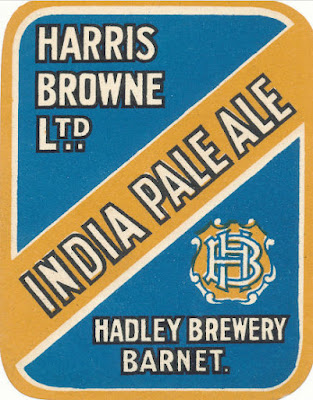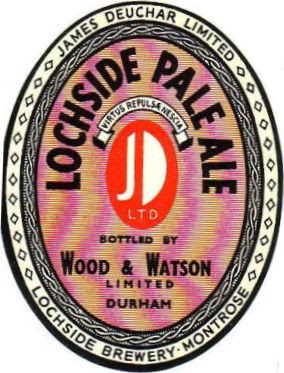I was asked recently whether before WW I, when beer was much stronger, if people really had sessions drinking pints. The answer is: yes. Which is why people regularly got totally plastered. This much is clear from the number of incidents reported in newspapers.
This is a fairly typical example. Drunk enters pub, is refused service and goes mental.
"PUBLIC BAR PRACTICES
Edward Carter did not appear in answer to a summons for being disorderly in the York Hotel on July 10th, and it was decided take the case in his absence.
Mr. J. F. Foulds, the Landlord, gave evidence to the effect that about 10 p.m. on the day in question defendant was kicking up a row in the public bar. He had been refused drink, but declined to leave the premises. The whole bar was in an uproar. Witness did not know what it was about, but a general practice was for the unruly ones drink up an old man's beer. They would not try it on young man, who might retaliate. Defendant made use the language which witness had written down. As he would not leave a policeman was sent for.
Kate Vine, the barmaid, corroborated. A fine 10s. and costs, in default 14 days, was imposed, the Chairman remarking that the language used was "something filthy.”
Superintendent Bristow observed that the ease was no reflection at all on the York Hotel. The house happened to the last place of call for people leaving the town in that direction."
Bexhill-on-Sea Observer - Saturday 24 July 1909, page 16.
I find it slightly worrying, as an old bastard myself, that some took advantage of a ruckus to nick the beer of old men. Disgraceful behaviour.
Here's another example, with some comic undertones:
"ROW IN A PUBLIC BAR.
AT the Burgh Police Court on Monday — Provost Porteous on the bench — James Laurence, cooper, North Roadside, was charged with having on 2nd January, in Market Street, in the public house occupied by George Gordon, spirit dealer (1) assaulted William Andrew Gray, barman, residing in Albany Street, and did strike him on the face with a roll of bread, which he threw with his hands; (2) behaved in a lawless and disorderly manner, cursed, swore, and used profane language, and challenged said William Andrew Gray to tight, refused to leave the public house and committed a breach of the peace.
Asked to plead, accused said he was guilty of swearing.
This was accepted as a plea of not guilty, and evidence was led.
William Andrew Gray, barman, Albany Street, first gave evidence. He deponed that he was employed in Mr Gordon's bar in Market Street, and knew the accused. On Saturday, 2nd January, accused came into the bar about 2.30. He was the worse of drink, and the man who was along with accused ordered drink. Witness refused to supply them, in comequence of accused's conduct on other occasions, and in consequence of the instructions he had received from Mr Gordon not to supply accused. Laurence was in the habit of being noisy and quarrelsome, and as he was the worse of drink, witness refused to supply him. He started swearing at witness, and then he threw a piece of roll at witness. Witness advised accused to leave the bar, but he did not do so and challenged witness to fight. He challenged everybody to fight, and created a big disturbance, so that a crowd collected. Latterly he left the public house, but witness did not follow him out. The disturbance went on for about half an hour.
John Harper, cooper, Lower Lochside, deponed being at the Turk's Head bar on the afternoon in question. Witness went into the bar after the disturbance had begun. Accused was there, and was cursing and swearing for William A. Gray, the barman, and challenged him to fight. He was interfering with everybody in the bar.
Mitchell White, cooper, Lower Lochside, was next called. He stated that he was in the bar before the accused came in. Accused came into the bar with another man, who ordered the drink. He said he would get none, while accused was with him, whereupon accused started swearing. He struck him with a piece of bread. He continued swearing at the barman, and was challenging everybody in the bar to fight.
In answer to the accused, witness said it was a small piece of bread that was thrown, and it could not hare done much harm.
Accused, in the witness-box, said he was very sorry for what had taken place, and he would promise it would not happen again. This concluded the evidence. Chief Constable Emslie reviewed the case, stating that the assault was not very serious, but the disturbance was very serious.
Provost Porteons said that so far as the assault was concerned, the case was not serious, but his conduct in the bar was much more serious, especially the challenging to fight.
Accused—It takes more than one man to make a row.
Provost Porteons--That may be. but your conduct on this occasion has not been very creditable. It is only the duty of the barman to refuse the drink in the circumstances, and had he done otherwise it would have been a breach of his duty, He, however, refused to supply the man, and it is to the credit of the barman that he did so. I would advise you to give up drink altogether. The penalty is - 15s, with the alternative of ten days' imprisonment.
Accused went to jail, but paid the fine in the course of the day."
Shetland Times - Saturday 16 January 1909, page 8.
Assault with a bread roll? Not even a whole bread roll. Bit of a laugh, being charged for that. Though Laurence does sound like a nasty drunk. And quite a determined one as he was already steaming by 2:30. Must have been a heavy lunchtime.
Note that both the accused and the two other drinkers called as witnesses were all coopers. Presumably for the whisky trade as they were on Shetland.













































































1 comment:
The bread roll incident occurred on 2 January, so the central figure had probably previously been celebrating Hogmanay in the traditional manner.
Post a Comment